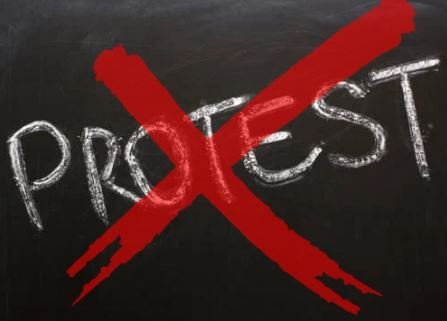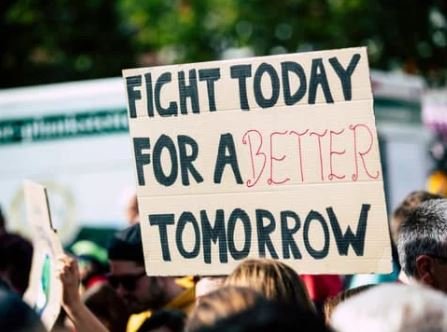Should We Protest For Change? Do protests work?

Last updated on December 2nd, 2023
Should we protest for change? If there is something that needs changing should we join the protest? Should we grab our placards and head to the streets?
It seems there’s a protest culture growing at the moment, more and more people are using it as a way to make their voices heard. And to demand change.
This is a topic with plenty of debate surrounding it. Some folk run out the door at the first whisper of a protest nearby, no matter the cause. While others wouldn’t be seen dead anywhere near one.
And whether you’re for them or against them there’s an argument for both sides. So, you might be wondering should we protest for change, or are there better ways to make your voice heard?
And speaking of change, if you’re thinking of making some positive changes this post might help 10 Essential Tips for New Vegans – To Make Becoming Vegan Much Easier!
Should we protest for change?
Arguments against protesting for change:

1. Protests cause traffic jams and delays
If you live in a busy city the commute to work can be the absolute bane of your life. Sitting in traffic for ages drives me completely bonkers. So when there’s a big protest happening nearby it is almost guaranteed there will be traffic jams around the city.
2. Slowing down emergency services
This goes hand in hand with traffic jams. If there’s an emergency and it is difficult for the ambulance, fire engine, or police car to get through, this could cost a life.
3. Kids missing school
Of course, people take to the streets and march at all ages but it seems more young people hold the passion and fire to be part of a movement to create change. According to 350.org, the 2019 Climate Strike brought 7.6 million out to demand change. And a big part of these people were students joining from the School Strike for Climate. Some people argue that education is the most important thing.
4. Protests can turn violent
Yes, this does happen. But we do need to consider the reasons protests turn violent. Some join protests to start trouble and don’t actually have good intentions and the desire for change. And of course, those in power may want to shut down the protest at all costs and this will often lead to violence.
5. Don’t cause a scene
As a kid, the first time we threw a tantrum in a supermarket our parents did pretty much everything in their power to make it stop immediately. As soon as we’re able to understand and control our own behaviours we’re told not to cause a scene. This creates a society that typically likes to fit in with the crowd. Never wanting to be noticed for being loud or demanding. So the idea of being on the street and shouting about what we want can be very uncomfortable for many of us.
6. Protests don’t actually work
This is a common belief and research shows that some people think that protests don’t actually work because protests rarely lead to overnight change.
Arguments for protesting for change:

1. Protests raise awareness and people ask why
Protests that reach the news make people ask why. Passing protests on the street make people ask why. Traffic jams as a result of protests make people ask why. Friends joining protests make people ask why.
2. Protests highlight problems
By hearing about a protest it forces people’s attention to the situation. They’re asking why people are bothering. And the more they ask the more they start to understand the problem.
We can have a problem that directly impacts us even if we don’t know it. Let’s say, I learn that my electricity meter is connected to my neighbour’s meter. And then I learn I’ve been paying their bill for the last 5 years. I’m sure as hell not going to continue paying it. So, I didn’t know about the problem but it had been there for years!
The climate crisis is everyone’s problem, equal rights for all is everyone’s problem. The more we learn about these problems the more we will realise they are our problems too.
According to YouGov in 2018 only 10% of British people said that the environment is one of the top issues facing the country. Levels started to rise in 2019 as a result of Extinction Rebellion protests. Then last year during COP-26 YouGov’s issues tracker reported that 40% of British people felt the environment was one of the top three issues facing the country.
3. If they can protest for change, I can do it too!
Some people want to be part of creating positive change for themselves and the next generation but don’t know how to do it. If you see someone doing something, it can often give you the confidence to do it too.
4. A protest for change does work, it can create big change
In 1986 People Power Revolution brought over a million Filipinos to the streets to overthrow the corrupt government of President Ferdinand Marcos. The Catholic Church and senior members of the army joined the people to rebel against Marcos and together they won.
The police officer responsible for the death of George Floyd was found guilty at his trial. But sadly many similar situations before George Floyd ended with the police officer responsible facing no charges. Why was this? Because this time people all over the world took to the streets and were watching. The world demanded justice. This was a catalyst for change.
Supporters of the LGBTQ community have taken to the streets for many years to fight for equal rights. The 1969 Stonewall Riots in New York were considered a watershed moment for the movement. This is now celebrated every year and is known as Pride.
5. A protest can create small change too
Every consequence of a protest doesn’t need to be a big one. If a law doesn’t change it doesn’t mean that it wasn’t successful. Changes in businesses, schools, homes, and people’s mindsets will have the biggest long-term impact. There is a chain reaction when it comes to real change and we must always remember this.
6. Protests create conversation
It’s natural, but even more, now that we’re in an age of social media, to want to talk about what’s happening around you. With conversations comes the opportunity to learn, understand, and develop an open mind.
So, should we protest for change?

Yes, I believe we should! Protests are so much more than standing on the streets shouting your demands. They’re about creating opportunities for us all to stand together to make change. They’re about us coming together to make the world a better place for all.
I can’t argue, that there are risk factors. Protests don’t always end peacefully and they do cause disruption. And sadly in countries where protests will be stopped using force and brutality, they can be a dangerous way to effect change.
But we also need to remember that not everything is as shown. This article in The Atlantic talks about how a group protesting the murder of George Floyd were shot at by police. Even as they shouted “don’t shoot” with their hands in the air the police used rubber bullets and tear gas against them. This incident was on the news at the same time as Trump was giving a speech from the White House Rose Garden. This footage was pretty useful for Trump’s argument that the protests weren’t peaceful. However, reports stated that the protests were peaceful until….police opened fire.
The intention of a protest is not to cause violence, damage, or injury. The hope for most new movements is that they will bring peace and fairness to the world.
People protest for change because they force attention to a situation. What alternatives are there?
If you enjoyed this post and are looking for ways to make changes that make a difference take a look at my post 5 ways to support sustainable fashion while looking and feeling fabulous in 2022!
Meet the Author

Meet Sinead O’Carroll: Vegan explorer, sustainability advocate and the founder of The Wondering Wandering Vegan. Embracing veganism since 2018 and vegetarianism since 2005, Sinead is armed with a Vegan Health, Nutrition and Lifestyle qualification, and is on a mission to share her passion for cruelty-free living.
With a taste for adventure and a heart for eco-conscious choices, she’s here to prove that vegans never miss out on flavour, fun or style. Join her in enjoying the delights of a vegan-friendly world! 🌱✈️🌍
Want to know more? Check out Sinead’s About page here.
Follow me on Instagram to see all the delicious vegan food I find, the vegan and cruelty-free products I use and what I get up to as a travelling vegan.
